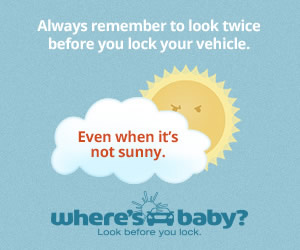
SAFETY TIPS
Kids in hot cars are a deadly combination. Whether intentional or accidental, these deaths are preventable, which makes it all the more tragic. Here are some helpful tips to make sure it doesn’t happen to you.
Remember:
• Never leave a child alone in a parked car, even with the windows rolled down, or air conditioning on. Children’s body temperature can heat up 3 to 5 times faster than adults’. A core temperature of 107 degrees is lethal.
• Always look in both the front and back of the vehicle before locking the door and walking way.
• Heatstroke can occur in temperatures as low as 57 degrees. On an 80-degree day, temperatures inside a vehicle can reach deadly levels in just 10 minutes.
• Never let children play in an unattended vehicle. Teach them a vehicle is not a play area.
• Always lock your vehicle doors and trunk and keep the keys out of a child’s reach. If a child is missing, quickly check all vehicles, including the trunk.
Is dropping off a child not part of your normal routine? Come up with some ways to remind yourself that the child is in the car.
• Place a briefcase, purse, or cell phone in the back next to the car seat so that you’ll always check the back seat before leaving the car.
• Call your spouse after you’ve dropped off your child to make sure you didn’t forget.
• Have daycare call you if your child doesn’t show up.
• Write a note and place it on the dashboard of the car. Or set a reminder on your cell phone or calendar. You can also download the Baby Reminder App for iPhones.
If you see a child alone in a hot vehicle:
• Always make sure the child is okay and responsive. If not, call 911 immediately.
• If the child appears okay, attempt to locate the parents or have the facility’s security or management page the car owner over the PA system.
• If the child is not responsive and appears in great distress, attempt to get into the car to assist the child, even if that means breaking a window.
Remember: kids in hot cars are a deadly combination. Don’t take the chance. Look before you lock.
Additional Resources:
•National Highway Traffic Safety Administration – www.safercar.gov/heatstroke
•San Jose State University, Department of Meteorology & Climate Science -www.noheatstroke.org
•Safe Kids – www.safekids.org
•Children’s Hospital of Philadelphia -www.chop.edu
SAFETY TIPS
Kids in hot cars are a deadly combination. Whether intentional or accidental, these deaths are preventable, which makes it all the more tragic. Here are some helpful tips to make sure it doesn’t happen to you.
Remember:
• Never leave a child alone in a parked car, even with the windows rolled down, or air conditioning on. Children’s body temperature can heat up 3 to 5 times faster than adults’. A core temperature of 107 degrees is lethal.
• Always look in both the front and back of the vehicle before locking the door and walking way.
• Heatstroke can occur in temperatures as low as 57 degrees. On an 80-degree day, temperatures inside a vehicle can reach deadly levels in just 10 minutes.
• Never let children play in an unattended vehicle. Teach them a vehicle is not a play area.
• Always lock your vehicle doors and trunk and keep the keys out of a child’s reach. If a child is missing, quickly check all vehicles, including the trunk.
Is dropping off a child not part of your normal routine? Come up with some ways to remind yourself that the child is in the car.
• Place a briefcase, purse, or cell phone in the back next to the car seat so that you’ll always check the back seat before leaving the car.
• Call your spouse after you’ve dropped off your child to make sure you didn’t forget.
• Have daycare call you if your child doesn’t show up.
• Write a note and place it on the dashboard of the car. Or set a reminder on your cell phone or calendar. You can also download the Baby Reminder App for iPhones.
If you see a child alone in a hot vehicle:
• Always make sure the child is okay and responsive. If not, call 911 immediately.
• If the child appears okay, attempt to locate the parents or have the facility’s security or management page the car owner over the PA system.
• If the child is not responsive and appears in great distress, attempt to get into the car to assist the child, even if that means breaking a window.
Remember: kids in hot cars are a deadly combination. Don’t take the chance. Look before you lock.
Additional Resources:
•National Highway Traffic Safety Administration – www.safercar.gov/heatstroke
•San Jose State University, Department of Meteorology & Climate Science -www.noheatstroke.org
•Safe Kids – www.safekids.org
•Children’s Hospital of Philadelphia -www.chop.edu
SAFETY TIPS
